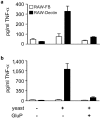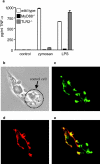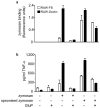Dectin-1 mediates the biological effects of beta-glucans
- PMID: 12719478
- PMCID: PMC2193964
- DOI: 10.1084/jem.20021890
Dectin-1 mediates the biological effects of beta-glucans
Abstract
The ability of fungal-derived beta-glucan particles to induce leukocyte activation and the production of inflammatory mediators, such as tumor necrosis factor (TNF)-alpha, is a well characterized phenomenon. Although efforts have been made to understand how these carbohydrate polymers exert their immunomodulatory effects, the receptors involved in generating these responses are unknown. Here we show that Dectin-1 mediates the production of TNF-alpha in response to zymosan and live fungal pathogens, an activity that occurs at the cell surface and requires the cytoplasmic tail and immunoreceptor tyrosine activation motif of Dectin-1 as well as Toll-like receptor (TLR)-2 and Myd88. This is the first demonstration that the inflammatory response to pathogens requires recognition by a specific receptor in addition to the TLRs. Furthermore, these studies implicate Dectin-1 in the production of TNF-alpha in response to fungi, a critical step required for the successful control of these pathogens.
Figures





Similar articles
-
Collaborative induction of inflammatory responses by dectin-1 and Toll-like receptor 2.J Exp Med. 2003 May 5;197(9):1107-17. doi: 10.1084/jem.20021787. Epub 2003 Apr 28. J Exp Med. 2003. PMID: 12719479 Free PMC article.
-
The role of SIGNR1 and the beta-glucan receptor (dectin-1) in the nonopsonic recognition of yeast by specific macrophages.J Immunol. 2004 Jan 15;172(2):1157-62. doi: 10.4049/jimmunol.172.2.1157. J Immunol. 2004. PMID: 14707091
-
Dectin-1 mediates macrophage recognition of Candida albicans yeast but not filaments.EMBO J. 2005 Mar 23;24(6):1277-86. doi: 10.1038/sj.emboj.7600594. Epub 2005 Feb 24. EMBO J. 2005. PMID: 15729357 Free PMC article.
-
Dectin-1 and Dectin-2 in innate immunity against fungi.Int Immunol. 2011 Aug;23(8):467-72. doi: 10.1093/intimm/dxr046. Epub 2011 Jun 15. Int Immunol. 2011. PMID: 21677049 Review.
-
[Contribution of dectin-1 to the recognition of fungal cell wall products and the activation of innate immune response].Nihon Ishinkin Gakkai Zasshi. 2006;47(3):185-94. doi: 10.3314/jjmm.47.185. Nihon Ishinkin Gakkai Zasshi. 2006. PMID: 16940953 Review. Japanese.
Cited by
-
Up-regulation of GITRL on dendritic cells by WGP improves anti-tumor immunity in murine Lewis lung carcinoma.PLoS One. 2012;7(10):e46936. doi: 10.1371/journal.pone.0046936. Epub 2012 Oct 15. PLoS One. 2012. PMID: 23077535 Free PMC article.
-
Signaling organelles of the innate immune system.Cell. 2012 Dec 7;151(6):1168-78. doi: 10.1016/j.cell.2012.11.011. Cell. 2012. PMID: 23217704 Free PMC article.
-
Immunogenetics associated with severe coccidioidomycosis.JCI Insight. 2022 Nov 22;7(22):e159491. doi: 10.1172/jci.insight.159491. JCI Insight. 2022. PMID: 36166305 Free PMC article.
-
Toll-like receptor 4 (TLR4) polymorphisms in Iranian patients with visceral leishmaniasis.Mol Biol Rep. 2012 Dec;39(12):10795-802. doi: 10.1007/s11033-012-1973-5. Epub 2012 Oct 6. Mol Biol Rep. 2012. PMID: 23053976
-
Innate immunity to Aspergillus species.Clin Microbiol Rev. 2009 Oct;22(4):535-51. doi: 10.1128/CMR.00014-09. Clin Microbiol Rev. 2009. PMID: 19822887 Free PMC article. Review.
References
-
- Czop, J.K. 1986. The role of beta-glucan receptors on blood and tissue leukocytes in phagocytosis and metabolic activation. Pathol. Immunopathol. Res. 5:286–296. - PubMed
-
- Ross, G.D., V. Vetvicka, J. Yan, Y. Xia, and J. Vetvickova. 1999. Therapeutic intervention with complement and beta-glucan in cancer. Immunopharmacology. 42:61–74. - PubMed
-
- Williams, D.L., A. Mueller, and W. Browder. 1996. Glucan-based macrophage stimulators. Clinical Immunotherapy. 5:392–399.
-
- Riggi, S.J., and N.R. Di Luzio. 1961. Identification of a reticuloendothelial stimulating agent in zymosan. Am. J. Physiol. 200:297–300. - PubMed
Publication types
MeSH terms
Substances
Grants and funding
LinkOut - more resources
Full Text Sources
Other Literature Sources
Medical
Molecular Biology Databases

